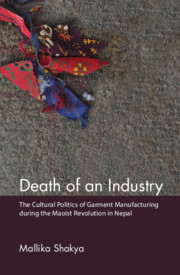 Death of an Industry
Death of an Industry Book contents
- Frontmatter
- Dedication
- Contents
- Figures and Table
- Abbreviations
- Key Names
- Acknowledgements
- 1 Situating the Idea: Industry, Society and Development
- 2 Nepal and Garments
- 3 A Garment Industry Ecosystem
- 4 The Normality of Garment Making
- 5 The MFA Expiry: A Garment Tsunami
- 6 Workers and Unions: Ethnicity and Class
- 7 Reconstituting the Garment Afterlife
- Bibliography
- Index
7 - Reconstituting the Garment Afterlife
Published online by Cambridge University Press: 08 July 2018
- Frontmatter
- Dedication
- Contents
- Figures and Table
- Abbreviations
- Key Names
- Acknowledgements
- 1 Situating the Idea: Industry, Society and Development
- 2 Nepal and Garments
- 3 A Garment Industry Ecosystem
- 4 The Normality of Garment Making
- 5 The MFA Expiry: A Garment Tsunami
- 6 Workers and Unions: Ethnicity and Class
- 7 Reconstituting the Garment Afterlife
- Bibliography
- Index
Summary
We witness in the garment ecosystem in Nepal, a long and messy process in which ethnicity, class, and competitiveness morphed together to constitute a macro-social assemblage that steered normality and was deeply affected by the crisis of MFA. It has been my position throughout this book that the way the garment industry is situated, both within Nepal and the international scene, is neither purely economic nor purely cultural but rather an amalgamation of these and more. Politics raised its head at every turn, ranging from the ruling (or economic) elites’ access to policy incentives and the cultural elite's access to niche markets, to developmental contestations that ended the MFA, and a class uprising that called for a regime change in Nepal. The metaphor of an ‘industrial ecosystem’, central to my narrative about the garment life cycle in Nepal, necessitates that each incumbent individual and institution is seen as part of a macro-sociality of ethnicity, class, and power. My ethnography shows how identity overshadowed the trajectories of class solidarity and business competitiveness. In this sense, the rhetoric of an anonymous supply-demand equilibrium directing industrialization trajectories is inadequate. What is necessary is to look at industries as part of a dispositif that drives the trajectories of national capitalism, on the one hand, and the People's War, on the other. In this chapter, I bring this argument up into the present time. I begin with the question of work in the context of the garment industry and then shift to discussions on life first, then rule, and conclude with a note on development.
Work and life
‘Work’ encompasses a wide range of productive arrangements an individual has with others, and in turn, individual and collective identities are deeply rooted in what one does for living. This is clearly a broad statement and can be stretched to mean a myriad of things. Work is a constituent of class status, but a proposition in this book is that it is also an identity marker that shapes the materiality of everyday lives, while situating individual beings within the twinned schemas of cultural hierarchy and political order. Applying this understanding to the work of garment-making means deconstructing stereotypes about those who worked in the readymade garment industry; they were seen either as neoliberal agents of international trade or as proletariat labour – lumpen or otherwise – and nothing else.
- Type
- Chapter
- Information
- Death of an IndustryThe Cultural Politics of Garment Manufacturing during the Maoist Revolution in Nepal, pp. 126 - 141Publisher: Cambridge University PressPrint publication year: 2018
